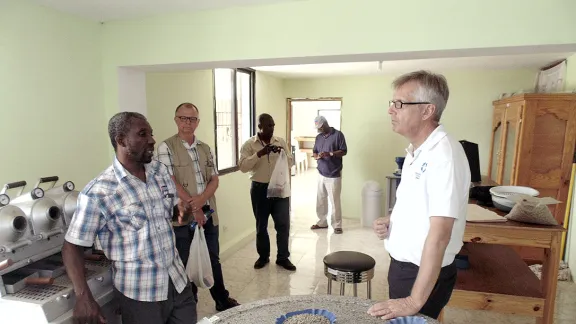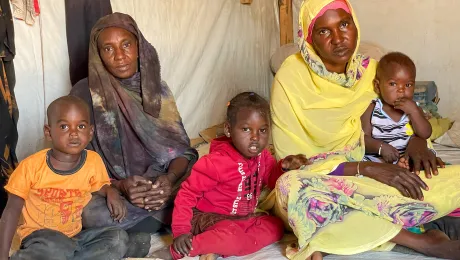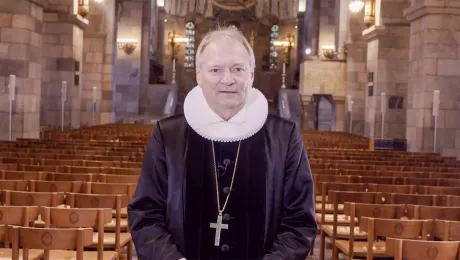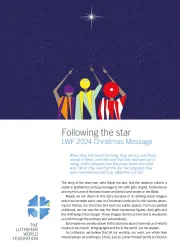
Rev. Martin Junge visiting one of LWF/DWS Haiti projects. Photo: LWF/DWS Haiti
Income Generating Schemes, Support to Most Vulnerable Groups
(LWI) – Since the devastating earthquake of January 2010 that killed more than 200 000 people in Haiti, damaged or destroyed more than 300,000 buildings and left 1.5 million people displaced from their homes, the Lutheran World Federation (LWF) program in the Caribbean country continues to work with partners on projects aimed at sustainable development, reducing the risks of natural disasters and rebuilding the environment.
“LWF Haiti is focusing on the need for sustainable change on behalf of the most vulnerable groups of Haiti’s population. As a result, we are working with projects that are enabling people to get sustainable incomes,” LWF Country Representative Perolof Lundqvist said. “The Human Rights-Based Approach developed by LWF Haiti also brings support to local communities in their advocacy campaigns for better inclusion, participation of vulnerable populations in decision-making processes, promotion of gender equality and equity, and psychosocial well‐being.”
LWF projects include work on food protection and reforestation as well as the MUSO, a micro bank system that allows poor people to get access to loans and savings so that they can start small businesses and income-generating activities in order to strengthen their resilience to natural disasters and other emergencies.
“We aren’t done yet, solidarity with the people of Haiti is still required,” said LWF General Secretary Rev. Martin Junge after a recent visit to the poorest country in the western hemisphere. “Haitian people are remarkably resilient. They have been hit by many human-made and natural disasters throughout their history, yet here they are claiming life in dignity and inviting LWF’s support!”
“I visited a milk-processing facility, which was built with the support of the LWF. For the LWF, it is an already closed project. But not for the people. I saw with delight how local organizations are running the factory. The milk production goes to local schools. The cheese they produce is sold to a supermarket in the capital city,” Junge said. “In view of the global discussion whether development aid makes sense at all, I was affirmed once more in my conviction: yes it does!“
Other LWF programs include income-generating activities with local partners in Foret des Pins, Macaya, and Palmes, and the Model Village in Gressier rehabilitation project, built for 180 destitute families after the earthquake.
“The community is growing in independence and will soon assume the entire responsibility for its own development and self-governance,” Lundqvist said of the Model Village.
“Local communities have also decided to protect one of the few remaining forests in Haiti. An area of more than 10,000 acres can’t be protected but by a community mobilized and resolved to fight for each single tree. This is the purpose of the network of organizations in Foret des Pins: to prevent further deforestation for the sake of their own communities and their future,” Junge added.
However, major challenges still remain for Haiti on its path towards recovery almost five years after the earthquake.
“The political instability in the country; a very vulnerable and polluted environment; the weak infrastructure and the increasing gulf between the wealthiest and the poorest in the country. These are factors that hamper the development and that we have to face and confront in order to be reliable as an organization working for the rights of the most vulnerable part of the population,” Lundqvist said.
“At a time when interest in this Caribbean country is decreasing among the main donors, the necessity of continuous support is greater than ever. The resilience of the Haitian people is enormous, but they need the necessary accompaniment in order to build a sustainable future.”


